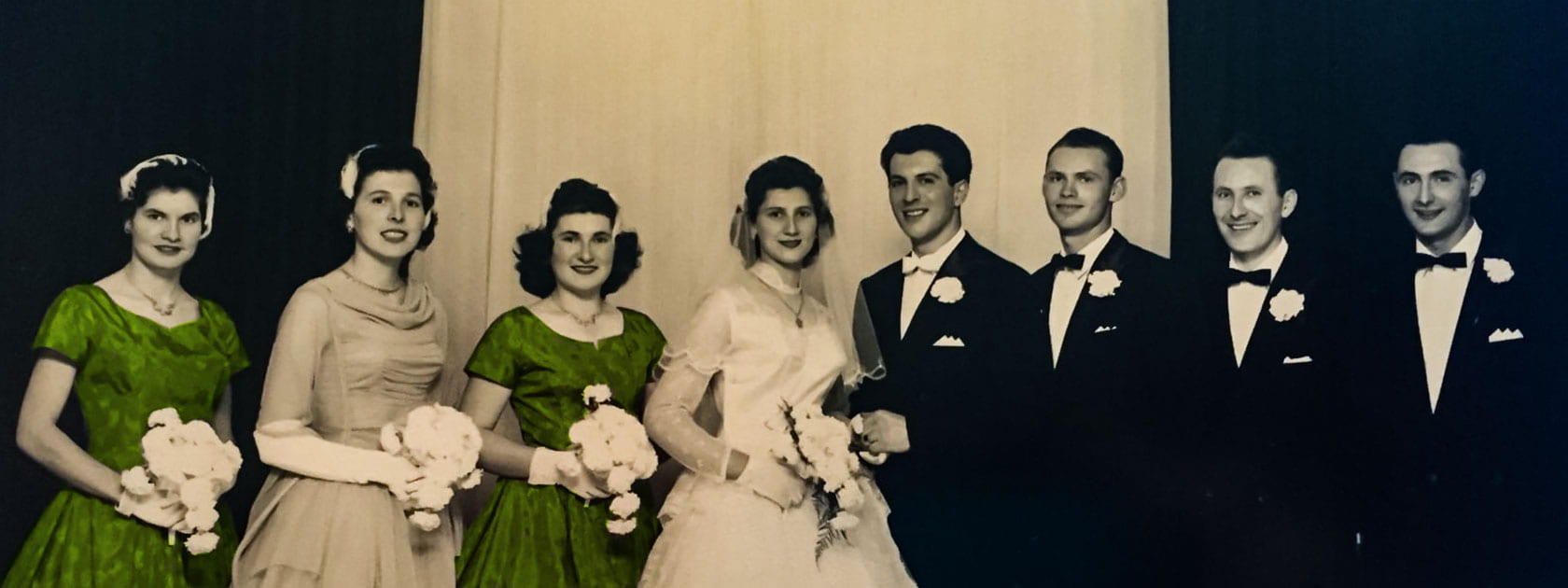Date
August 07, 2011
Maker
Columbus Centre
Accession#
ICEA2011.0067.0001
Interview With Elisa Germano Pillarella & Joyce Pillarella
Video interview in Italian and English with Elisa Germano Pillarella and her daughter/interivewer Joyce Pillarella. Elisa speaks about her father, Nicola Germano, who was interned during World War II and shares her own reflections of the internment experience. Joyce also shares her opinions about this event.
Elisa was born on March 21, 1920 in Ururi, an Albanese speaking town in Campobasso, Italy, and had three brothers one of whom died at an early age. Elisa grew up in Italy under the fascist regime and learned marches, songs, and activities while in school. Her father Nicola Germano was born on March 5, 1887 and immigrated to Montreal, Quebec in 1920. He became a citizen (naturalized British subject) on January 7,1924. According to Elisa, her father was strict and a strong fascist supporter in Italy and in Montreal, where he openly showed his support through organizations such as Casa d’Italia and the dopolavoro. In Montreal, he worked at Canadian Tube and Steel and sent money back to his family, who he had left behind in Ururi. Nicola visited and corresponded with his family until he was rounded up on June 10, 1940. He was taken first to Bordeaux Jail and then to the internment camps in Petawawa and Fredericton. For months the family did not know that Nicola was interned. Correspondence and financial support to the family ceased after Nicola’s arrest. During this time Elisa’s mother became sick and died as there was no money for medicine. Her father was eventually released on February 9, 1943. After the war, Elisa immigrated to Montreal and became a teacher and a writer. Her father never discussed the internment experience or politics with his family, only with friends. Nicola’s story was brought to life via extensive research by his granddaughter and local researcher Joyce Pillarella.
In this opening clip Elisa Germano Pillarella introduces herself and speaks about growing up in Ururi, Italy under the fascist regime.
Elisa Germano Pillarella speaks about learning about fascism in school and also speaks of the positive reforms introduced by Mussolini.
Elisa Germano Pillarella discusses her father’s migration to Canada and her life in Italy with her mother and brothers.
Elisa Germano Pillarella briefly mentions the reason her father migrated to Canada.
Elisa Germano Pillarella briefly speaks about her schooling in Italy.
Elisa Germano Pillarella recounts the events of June 10, 1940 and her father’s arrest. She also speaks about her father’s involvement with the fascio in Montreal.
Elisa Germano Pillarella discusses how she and her family found out about her father’s internment. She and Joyce Pillarella then go on to discuss one of the photographs they have of Nicola Germano and his unwavering support of fascism.
In this clip Elisa Germano Pillarella and Joyce Pillarella discuss Nicola Germano’s involvement in World War II and various organizations in Montreal. They then go on to describe how Nicola defended himself when he appeared before the camp tribunal.
Elisa Germano Pillarella speaks about the Italian Canadian men who acted as informants in Montreal.
Elisa Germano Pillarella discusses her involvement with communism in Italy and how this affected her migration to Canada. She also speaks about how her communist beliefs clashed with her father’s support of fascism.
Elisa Germano Pillarella shares stories from her father’s internment experience that reveal his character.
In this clip Elisa Germano Pillarella shares her father’s camp stories involving Camillien Houde, the mayor of Montreal who was also interned during WWII.
Elisa Germano Pillarella discusses how she was introduced to her father’s friends upon her arrival to Montreal and how she became involved with the Italian organizations and began writing for Mario Duliani.
Elisa Germano Pillarella speaks about her life in Canada after her migration to Montreal in 1948.
Elisa Germano Pillarella and Joyce Pillarella share that Nicola Germano took a suitcase full of documents from the Casa d’Italia and asked a friend to hide the suitcase in the days prior to June 10, 1940.
Elisa Germano Pillarella discusses why she turned to communism after the war.
Elisa Germano Pillarella briefly speaks about donating gold to the Italian cause in Ethiopia prior to WWII.
Elisa Pillarella Germano shares her father’s feeling on the internment and how he forgave the men who provided the government with information that led to his internment.
Elisa Germano Pillarella speaks about her father’s unwavering belief in fascism.
Elisa Germano Pillarella speaks about her father’s experience of being detained at Bordeaux Prison in Montreal prior to his internment at Petawawa.
Joyce Pillarella and Elisa Germano Pillarella discuss the letter Nicola Germano wrote to try and garner his release from internment.



